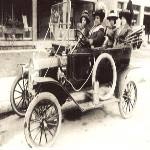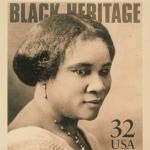
SHIRLEY GRIFFITH:I'm Shirley Griffith.
RICH KLEINFELDT: And I'm Rich Kleinfeldt with the Special English program PEOPLE IN AMERICA. Every week, we tell the story of someone important in the history of the United States. Today we tell about Madam C. J. Walker. She was a businesswoman, the first female African American to become very rich.
(MUSIC)
SHIRLEY GRIFFITH: In the early 1900s, life for most African-Americans was very difficult. Mobs of white people attacked and killed black people. It was legal to separate groups of people by race. Women, both black and white, did not have the same rights as men.
Black women worked very long hours for little wages. They worked mostly as servants or farm workers. Or they washed clothes. Madam C. J. Walker worked as a washerwoman for 20 years. She then started her own business of developing and selling hair-care products for black women.
Madam Walker, however, did more than build a successful business. Her products helped women have a better sense of their own beauty. Her business also gave work to many black women. And, she helped other people, especially black artists and civil rights supporters. She said: "My object in life is not simply to make money for myself or to spend it on myself. I love to use a part of what I make in trying to help others. "
(MUSIC)
RICH KLEINFELDT: Madam C. J. Walker was very poor for most of her life.
She was born Sarah Breedlove in the southern state of Louisiana in 1867. Her parents were former slaves. The family lived and worked on a cotton farm along the Mississippi River. Cotton was a crop that grew well in the rich, dark soil near the river.
Most children of slaves did not go to school. They had to work. By the time Sarah was five years old, she was picking cotton in the fields with her family. She also helped her mother and sister earn money by washing clothes for white people.
There was no water or machine to wash clothes in their home. The water from the Mississippi River was too dirty. So, they used rainwater. Sarah helped her mother and sister carry water to fill big wooden containers. They heated the water over the fire. Then they rubbed the clothes on flat pieces of wood, squeezed out the water and hung each piece to dry. It was hard work. The wet clothes were heavy, and the soap had lye in it. Lye is a strong substance that cleaned the clothes well. But it hurt people's skin.
SHIRLEY GRIFFITH: When Sarah was seven years old, her parents died of the disease yellow fever. She and her sister moved to Vicksburg, Mississippi. At the age of 14, Sarah married Moses McWilliams. They had a daughter after they were married for three years. They named their daughter Lelia. Two years later, Moses McWilliams died in an accident.
Sarah was alone with her baby. She decided to move to Saint Louis, Missouri. She had heard that washerwomen earned more money there. Sarah washed clothes all day. At night, she went to school to get the education she had missed as a child. She also made sure that her daughter Lelia went to school. Sarah saved enough money to send Lelia to college.
Sarah began to think about how she was going to continue to earn money in the future. What was she going to do when she grew old and her back grew weak?
She also worried about her hair. It was dry and broken. Her hair was falling out in some places on her head. Sarah tried different products to improve her hair but nothing worked. Then she got an idea. If she could create a hair product that worked for her, she could start her own business.
(MUSIC)

RICH KLEINFELDT: At the age of 37, Sarah invented a mixture that helped her hair and made curly hair straight. Some people believe that Sarah studied the hair product she used and added her own "secret" substance. But Sarah said she invented the mixture with God's help. By solving her hair problem, she had found a way to improve her life.
Sarah decided to move west to Denver, Colorado. She did not want to compete with companies in Saint Louis that made hair-care products. For the first time in her life, Sarah left the area along the Mississippi River where she was born.
Sarah found a job in Denver as a cook. She cooked and washed clothes during the day. At night she worked on her hair products. She tested them on herself and on her friends. The products helped their hair. Sarah began selling her products from house to house.
SHIRLEY GRIFFITH: In 1906, she married Charles Joseph Walker. He was a newspaperman who had become her friend and adviser. From then on, Sarah used the name Madam C. J. Walker.
Madam Walker organized women to sell her hair treatment. She established Walker schools of beauty culture throughout the country to train the saleswomen. The saleswomen became known as "Walker Agents. " They became popular in black communities throughout the United States.
Madam Walker worked hard at her business. She traveled to many American cities to help sell her products. She also traveled to the Caribbean countries of Jamaica, Panama, and Cuba. Her products had become popular there, too.
RICH KLEINFELDT: Madam Walker's business grew quickly. It soon was employing 3,000 people. Black women who could not attend her schools could learn the Walker hair care method through a course by mail. Hundreds, and later thousands, of black women learned her hair-care methods. Madam Walker's products helped these women earn money to educate their children, build homes and start businesses.
Madam Walker was very proud of what she had done. She said that she had made it possible "for many colored women to abandon the washtub for more pleasant and profitable occupations. "
(MUSIC)
SHIRLEY GRIFFITH: In 1908, Madam Walker moved her business east to Pittsburgh, Pennsylvania. Pittsburgh was closer to cities on the Atlantic coast with large black populations, cities such as New York, Washington, D. C. and Baltimore. Two years later, she established a laboratory and a factory in Indianapolis, Indiana. There, her products were developed and made.
Some people criticized Madam Walker's products. They accused her of straightening black women's hair to make it look like white women's hair.
Some black clergymen said that if black people were supposed to have straight hair, God would have given it to them. But Madam Walker said her purpose was to help women have healthy hair. She also said cleanliness was important. She established rules for cleanliness for her employees. Her rules later led to state laws covering jobs involving beauty treatment.
RICH KLEINFELDT: Madam C. J. Walker became very rich and famous. She enjoyed her new life. She also shared her money. She became one of the few black people at the time wealthy enough to give huge amounts of money to help people and organizations. She gave money to the National Association for the Advancement of Colored People, to churches and to cultural centers.
Madam Walker also supported many black artists and writers. And, she worked hard to end violations against the rights of black people. In 1917, she was part of a group that went to Washington, D. C. to meet with President Woodrow Wilson. The group urged him and Congress to make mob violence a federal crime.
In 1918, Madam Walker finally settled in a town near New York City where she built a large, beautiful house. She continued her work, but her health began to weaken. Her doctors advised her to slow down. But she would not listen. She died the next year. She was 51 years old.
(MUSIC)
SHIRLEY GRIFFITH: Madam C. J. Walker never forgot where she came from. Nor did she stop dreaming of how life could be. At a meeting of the National Negro Business League, Madam Walker explained that she was a woman who came from the cotton fields of the South. "I was promoted from there to the washtub," she said. "Then I was promoted to the cook kitchen, and from there I promoted myself into the business of manufacturing hair goods and preparations. I have built my own factory on my own ground. "
She not only improved her own life, but that of other women in similar situations. Madam C. J. Walker explained it this way: "If I have accomplished anything in life, it is because I have been willing to work hard. "
(MUSIC)
RICH KLEINFELDT: This Special English program was written by Vivian Bournazian. I'm Rich Kleinfeldt.
SHIRLEY GRIFFITH: And I'm Shirley Griffith. Join us again next week at this time for another PEOPLE IN AMERICA program on the Voice of America.
lye: a strong caustic alkaline solution of potassium or sodium salts, obtained by leaching wood ashes. It is much used in making soap as well as its use in biodiesel 堿液
Scott Joplin, 1867-1917: The king of ragtime music
Margaret Mead: a public face of Anthropology
William Faulkner: America’s greatest Southern writer
Eleanor Creesy: she guided one of the fastest sailing ships
(來源:VOA 編輯:陳丹妮)
